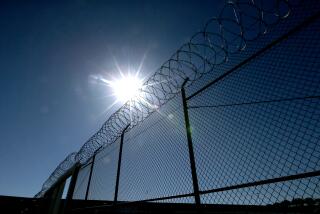L.A. Now Live: Gov. Brown’s appeal on prison crowding rejected

Talk with Times reporter Paige St. John at 9 a.m. about what it means for California now that the U.S. Supreme Court has refused to hear Gov. Jerry Brown’s appeal of an order to reduce prison crowding.
The court action on Tuesday further narrows the governor’s options in his quest to end what he characterizes as an arbitrary cap on the inmate population.
The cap was ordered by three federal judges in California, and Brown had asked the high court to remove it. Having lost that bid, he will continue to pursue a request through the lower court for more time to comply, according to a California Department of Corrections and Rehabilitation spokeswoman.
The governor so far has fought proposals to shorten the sentences of inmates who are considered at low risk to commit new offenses, saying that would threaten public safety. He has vowed to keep prisoners locked up, sending them to private facilities across the nation if necessary.
The state’s prisons have long been beset by problems in the delivery of medical care and psychiatric services, inmate suicides and lawsuits over other conditions. The three judges ruled that the problems were due to overcrowding and in 2009 ordered the state to remove about 43,000 inmates.
The state has moved some prisoners to private facilities, built a new medical prison and kept more than 20,000 prisoners and parole violators in county jails rather than send them to state prisons. Officials have also signed agreements with private prison operators to provide almost 3,800 beds at three facilities.
The latest of those deals was announced Tuesday -- an $86-million, three-year contract to take over a California City prison that houses federal immigration detainees.
But a Corrections Department spokeswoman said Tuesday that the state still has 4,400 more prisoners than the cap permits.
More to Read
Start your day right
Sign up for Essential California for news, features and recommendations from the L.A. Times and beyond in your inbox six days a week.
You may occasionally receive promotional content from the Los Angeles Times.






